一般过去式疑问句否定句讲解与练习
一般现在时和一般过去时精讲+练习题

一、一般现在时(一)概念:表示经常性或习惯性的动作,或存在的状态1、肯定句:主语+谓语+其他。
She reads English everyday .2、否定句:主语+don’t/doesn’t+谓语+其他。
He doesn’t get up at 6:30 in the morning .3、一般疑问句:Do/Does+主语+V原+其他?Do you like English ? Yes, I do. /No, I don’t .4、特殊疑问句:特殊疑问词+do/does+主语+V原+其他?What time do you get up every morning ?Where does your father work ?(四)具体用法1、表示经常性或习惯性的动作,或存在的状态,常与表示频率的时间状语如:often , sometimes , usually,always , seldom,never, every day /year/month...), once/twice a week (month , year , etc.) , on Sundays等连用。
I leave home for school at seven every morning .2、在以when,if, as soon as, as long as等连词引导的从句中,当主句的谓语动词是一般将来时,那么从句的谓语动词通常用一般现在时来表示将来要发生的动作。
(主将从现)I'll tell him the news when he comes back. 他回来时,我将告诉他这个消息。
If you come this afternoon,we’ll have a meeting.今天下午如果你来,我们就开个会。
3、描述事物的状态、性质、特征等,例如:The door is open. 门是开着的。
The apple is sweet.这个苹果是甜的。
超详细一般过去时的全面讲解【附练习与答案】
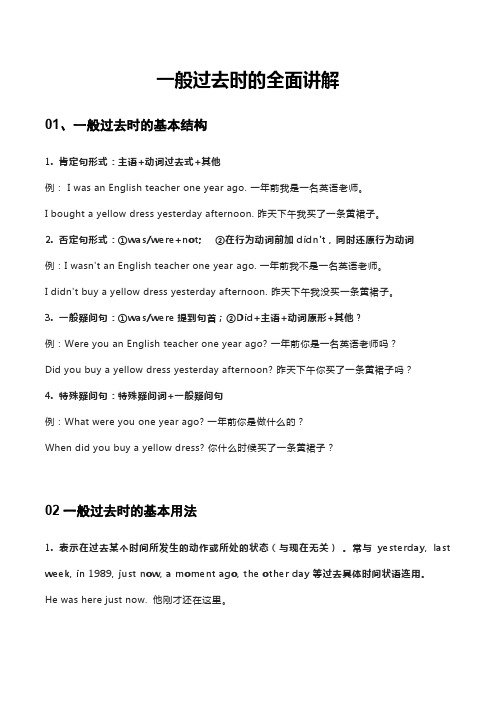
一般过去时的全面讲解01、一般过去时的基本结构1. 肯定句形式:主语+动词过去式+其他例: I was an English teacher one year ago. 一年前我是一名英语老师。
I bought a yellow dress yesterday afternoon. 昨天下午我买了一条黄裙子。
2. 否定句形式:①was/were+not; ②在行为动词前加didn't,同时还原行为动词例:I wasn't an English teacher one year ago. 一年前我不是一名英语老师。
I didn't buy a yellow dress yesterday afternoon. 昨天下午我没买一条黄裙子。
3. 一般疑问句:①was/were提到句首;②Did+主语+动词原形+其他?例:Were you an English teacher one year ago? 一年前你是一名英语老师吗?Did you buy a yellow dress yesterday afternoon? 昨天下午你买了一条黄裙子吗?4. 特殊疑问句:特殊疑问词+一般疑问句例:What were you one year ago? 一年前你是做什么的?When did you buy a yellow dress? 你什么时候买了一条黄裙子?02一般过去时的基本用法1. 表示在过去某个时间所发生的动作或所处的状态(与现在无关)。
常与yesterday, last week, in 1989, just now, a moment ago, the other day等过去具体时间状语连用。
He was here just now. 他刚才还在这里。
What did you do yesterday? 你昨天做了什么事?2. 在过去一段时间内的经常性或习惯性动作。
一般过去时练习题及讲解 2
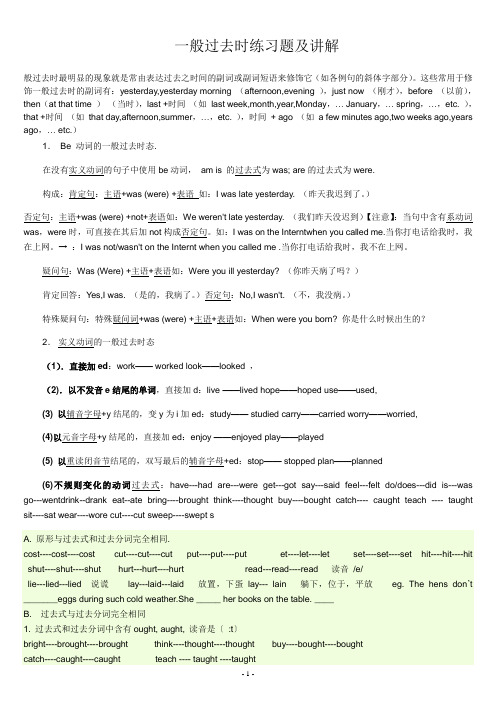
一般过去时练习题及讲解般过去时最明显的现象就是常由表达过去之时间的副词或副词短语来修饰它(如各例句的斜体字部分)。
这些常用于修饰一般过去时的副词有:yesterday,yesterday morning (afternoon,evening ),just now (刚才),before (以前),then(at that time )(当时),last +时间(如last week,month,year,Monday,… January,… spring,…,etc. ),that +时间(如that day,afternoon,summer,…,etc. ),时间+ ago (如a few minutes ago,two weeks ago,years ago,… etc.)1.Be 动词的一般过去时态.在没有实义动词的句子中使用be动词,am is 的过去式为was; are的过去式为were.构成:肯定句:主语+was (were) +表语如:I was late yesterday. (昨天我迟到了。
)否定句:主语+was (were) +not+表语如:We weren't late yesterday. (我们昨天没迟到)【注意】:当句中含有系动词was,were时,可直接在其后加not构成否定句。
如:I was on the Interntwhen you called me.当你打电话给我时,我在上网。
→:I was not/wasn't on the Internt when you called me .当你打电话给我时,我不在上网。
疑问句:Was (Were) +主语+表语如:Were you ill yesterday? (你昨天病了吗?)肯定回答:Yes,I was. (是的,我病了。
)否定句:No,I wasn't. (不,我没病。
)特殊疑问句:特殊疑问词+was (were) +主语+表语如:When were you born? 你是什么时候出生的?2.实义动词的一般过去时态(1).直接加ed:work—— worked look——looked ,(2).以不发音e结尾的单词,直接加d:live ——lived hope——hoped use——used,(3) 以辅音字母+y结尾的,变y为i加ed:study—— studied carry——carried worry——worried,(4)以元音字母+y结尾的,直接加ed:enjoy ——enjoyed play——played(5) 以重读闭音节结尾的,双写最后的辅音字母+ed:stop—— stopped plan——planned(6)不规则变化的动词过去式:have---had are---were get---got say---said feel---felt do/does---did is---was go---wentdrink--drank eat--ate bring----brought think----thought buy----bought catch---- caught teach ---- taught sit----sat wear----wore cut----cut sweep----swept sA. 原形与过去式和过去分词完全相同.cost----cost----cost cut----cut----cut put----put----put et----let----let set----set----set hit----hit----hit shut----shut----shut hurt---hurt----hurt read---read----read 读音/e/lie---lied---lied 说谎lay---laid---laid 放置,下蛋lay--- lain 躺下,位于,平放eg. The hens don’t _______eggs during such cold weather.She _____ her books on the table. ____B. 过去式与过去分词完全相同1. 过去式和过去分词中含有ought, aught, 读音是〔:t〕bright----brought----brought think----thought----thought buy----bought----boughtcatch----caught----caught teach ---- taught ----taught( )1.my father______ill yesterday.a.isn't b.aren't c.wasn't dweren't ( )2.______your parents at home last week﹖a.is b.was c.are d.were ( )3.the twins______in dalian last year.they______here now.a.are; were b.were; are c.was; are d.were; was( )4.______your father at work the day_____yesterday(前天)﹖a.was; before b.is; before c.was; after d.is; after ( )5.—who was on duty last friday﹖—______.a.i am b.i was c.yes, i was d.no, i wasn't ( )6. i cleaned my classroom ___________.a with three hoursb three hours agoc in three hoursd three hours before ( ) 7. i came _______ my house two days ago .a back onb back toc to backd back( ) 8 . ___________? he did some reading at home.a what does your father do yesterday eveningb what does your brother do in the schoolc what did your brother do over the weekend d where did your brother go last sunday ( ) 9. what did you do ________ ? i went to the movies.a next morningb over the weekendc in the weekend d next monday( )10. the koala sleeps _______,but gets up _________.a during the day; at the eveningb at day ;during nightc in the day ;during the eveningd during the day ; at night二、请用正确动词形式填空。
2023年译林一般过去式知识点以及练习

一般过去时旳练习句子变化形式(一)一般过去时旳一般疑问句(1)1.把 was, were放在句首, 其他位置不变。
由Was…? 引导旳一般疑问句, 肯定答为: Yes,… was.否认回答为: No,…wasn’t;由Were…?引导旳一般疑问句, 肯定回答为: Yes,…were.否认回答为: No,…weren’t.如:She was happy yesterday.---Was she happy? Yes, she was.(肯定回答) No, She wasn’t(否认回答)(2)They were in Li Yan’s home last night.(3)---Were they in Li Yan’s home last night?-Yes, they were.(肯定回答)--No, they weren’t(否认回答)2.在行为动词旳句子中, 要用助动词did 来引导, 其他旳语序不变。
要注意旳是, 要把行为动词旳过去式改为原形。
肯定回答为: Yes,…did;否认No,…didn’t.如: John played computer games last night.---Did John play computer games last night?Yes, he did. No,he didn’t(二)一般过去时旳否认句1.在表达过去存在旳状态旳句子中, 相接在was, were旳背面加上not。
如:(1)He was in the park last Sunday.He was not in the park last Sunday.(2) We were busy last week.We were not busy last week.2.在表达过去旳时间发生旳动作旳句子中, 要在行为动词旳前面加助动词didn’t.然后把过去式旳行为动词改为动词原形。
即: didn’t+ 动词原形。
初中英语七年级一般过去时讲解

初一一般过去时讲解一般过去时:一、一般过去时的构成:主语+谓语(动词过去式)+句子其他成分;主语+was/were+形容词/名词/介词短语+过去时间;否定形式①was/were+not;①在行为动词前加didn't,同时还原行为动词;一般疑问句Did+主语+do+其他注意:这里的-ing形式叫做现在分词二、一般过去时句型变化:1、肯定式:主语+谓语(动词过去式)+句子其他成分;主语+was/were+形容词/名词/介词短语+过去时间如:They played computer games together. 他们一起打游戏来着。
I was happy when last week. 上周我很开心。
2、否定式:否定形式①was/were+not;②在行为动词前加didn't,同时还原行为动词;如:They weren't in Paris last year. 他们去年不在巴黎。
I didn’t know that. 我不知道那件事。
3、一般疑问句Did+主语+do+其他。
如:Did you do your homework? 你做作业了吗?4、特殊疑问句式:特殊疑问句结构:特殊疑问词+一般疑问句?现在进行时的特殊疑问句结构:①特殊疑问词+did+主语+do(+其他成分)?②特殊疑问词+was/were+主语+do(+其他成分)?eg:1、What did you do?你们干什么来着?We played basketball.我们打篮球来着。
2、Where were your parents last year?你父母去年在哪里?They were in Tokyo.他们在东京。
注1:1、be动词在现在进行时里算作“助动词”,翻译现在进行时的时候,be不能解释为“是”,否则不通顺。
它只是和现在分词搭配构成“进行时”。
2、变一般疑问句时,形成“一问一答”的关系,要注意第一人称和第二人称相互交换。
一般过去时的用法及结构
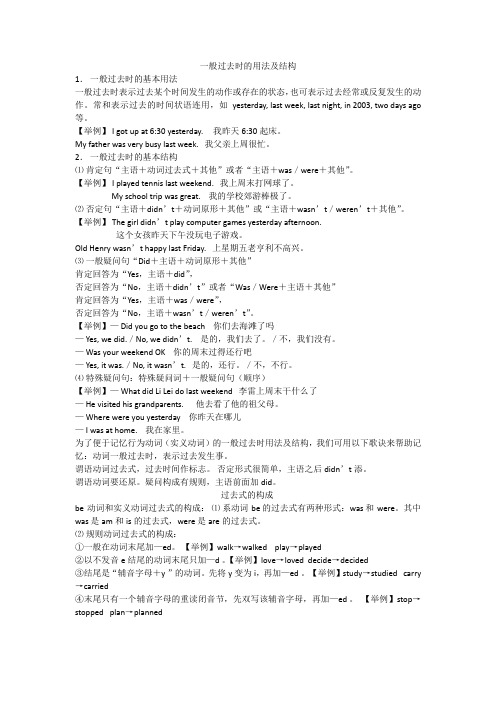
一般过去时的用法及结构1.一般过去时的基本用法一般过去时表示过去某个时间发生的动作或存在的状态,也可表示过去经常或反复发生的动作。
常和表示过去的时间状语连用,如yesterday, last week, last night, in 2003, two days ago 等。
【举例】 I got up at 6:30 yesterday. 我昨天6:30起床。
My father was very busy last week. 我父亲上周很忙。
2.一般过去时的基本结构⑴肯定句“主语+动词过去式+其他”或者“主语+was/were+其他”。
【举例】 I played tennis last weekend. 我上周末打网球了。
My school trip was great. 我的学校郊游棒极了。
⑵否定句“主语+didn’t+动词原形+其他”或“主语+wasn’t/weren’t+其他”。
【举例】 The girl didn’t play computer games yesterday afternoon.这个女孩昨天下午没玩电子游戏。
Old Henry wasn’t happy last Friday. 上星期五老亨利不高兴。
⑶一般疑问句“Did+主语+动词原形+其他”肯定回答为“Yes,主语+did”,否定回答为“No,主语+didn’t”或者“Was/Were+主语+其他”肯定回答为“Yes,主语+was/were”,否定回答为“No,主语+wasn’t/weren’t”。
【举例】— Did you go to the beach 你们去海滩了吗— Yes, we did./No, we didn’t. 是的,我们去了。
/不,我们没有。
— Was your weekend OK 你的周末过得还行吧— Yes, it was./No, it wasn’t. 是的,还行。
/不,不行。
⑷特殊疑问句:特殊疑问词+一般疑问句(顺序)【举例】— What did Li Lei do last weekend 李雷上周末干什么了— He visited his grandparents. 他去看了他的祖父母。
小学英语一般过去时专项讲解、练习和参考答案
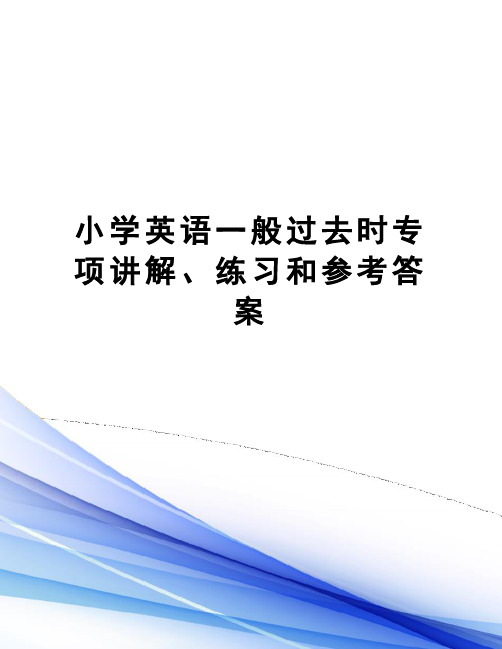
小学英语一般过去时专项讲解、练习和参考答案一般过去时专项讲解与练习一、概念:一般过去时表示过去某一时候发生的动作或存在的状态。
常与一般过去时连用的时间状语有:yesterday; 昨天just now刚才the day before yesterday;前天⋯⋯ago ⋯⋯之前(例如:三天前 three days ago )Last ⋯⋯上一个⋯(例如:上周星期天last Sunday )in 1990在1990年(in+过去时间)二、分类(一) be 动词的一般过去时:肯定句:主语 +be 动词的一般过去时( was/were)否定句:主语+be动词的一般过去时(was/were)+not一般疑问句: be 动词的一般过去时( was/were )+主语(二) there be结构的一般过去时与be 动词的一般过去时的变化基本一致。
(三)一般动词的过去时:肯定句:主语 +动词的过去时( I laughed.)否定句:主语 +did not+ 动词原形( I didn’t laugh.)一般疑问句: Did+主语 +动词原形( Did you laugh?)三.巧记 chant动词一般过去时,表示过去发生事;be 用 was 或用 were, have,has变had;谓语动词过去式,过去时间坐标志;一般动词加 -ed ,若是特殊得硬记。
否定句很简单,主语之后didn ’ t 添;疑问句也不难, did 放在主语前;如果谓语之前有 did ,谓语动词需还原;动词若是 was,were, 否定就把 not 添。
四、习题练习(一)用动词的适当形式填空:1.He ______ (work) in that bank four years ago.2.She ______ (live) in the US last Monday.3.I ______ (see) him yesterday.4.He _______(come) to school at 6 o’clock this morning.5.The boy _______ (have) a bad cold yesterday.6.When _______ you _______ (buy) that house?7.He _______(tell) a story to his daughter yesterday.8._____ you ____ (try) to call me last night?9.What _______you _______ (buy) in the shop?I ______ (buy) a coat just now.10. The doctor ______ (get) up late this morning.11.She ________ (paint) the wall last month.12.My mother _______ (be) a worker 20 years ago.13.________ (be) you here just now?No, I ________ (be not) here.14.Why _______ your brother _______ (cry) last night?15.It ______(be) my mother’s birthday yesterday.(二)翻译下列句子:1.我上周去看爷爷和奶奶了。
一般过去时的肯定句,否定句,一般疑问句,特殊疑问句
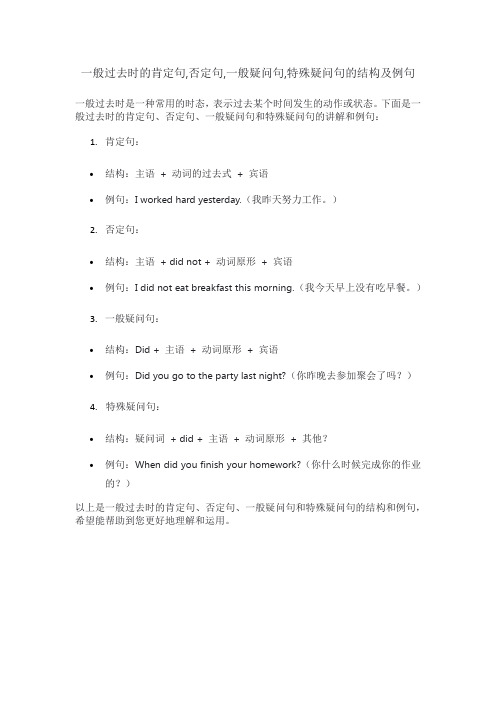
一般过去时的肯定句,否定句,一般疑问句,特殊疑问句的结构及例句
一般过去时是一种常用的时态,表示过去某个时间发生的动作或状态。
下面是一般过去时的肯定句、否定句、一般疑问句和特殊疑问句的讲解和例句:
1.肯定句:
•结构:主语+ 动词的过去式+ 宾语
•例句:I worked hard yesterday.(我昨天努力工作。
)
2.否定句:
•结构:主语+ did not + 动词原形+ 宾语
•例句:I did not eat breakfast this morning.(我今天早上没有吃早餐。
)
3.一般疑问句:
•结构:Did + 主语+ 动词原形+ 宾语
•例句:Did you go to the party last night?(你昨晚去参加聚会了吗?)
4.特殊疑问句:
•结构:疑问词+ did + 主语+ 动词原形+ 其他?
•例句:When did you finish your homework?(你什么时候完成你的作业的?)
以上是一般过去时的肯定句、否定句、一般疑问句和特殊疑问句的结构和例句,希望能帮助到您更好地理解和运用。
初中英语一般过去时讲解练习及答案

一、一般去的定一般去表示去某一候或某一段所生了的事情或存在的状。
常与去 yesterday,thismorning,justnow,amomentago,inMay,last night/year/week,onceuponatime,theotherday,beforeclause,in⋯the,when –past用。
如:Whatdidyoudoyesterday?昨天你干了什么?ImetLinTaothismorning.今日上午我会到了林涛。
Iwasthereamomentago. 才我在那边二、用法明1表示在去某个所生的作或所的状。
常与yesterday,lastweek,in1989,justnow,amomentago,theotherday等用。
如:Hewasherejustnow.他才在里。
Whatdidyoudoyesterday?你昨天做了什么事?在去一段内的常性或性作。
如:Weoftenplayedtogetherwhenwewerechildren.我小候常在一同玩。
注:表示去常生的作可用usedto如:Heusedtosmokealot,buthedoesn和would。
’他tnow去.常吸烟,但在不抽了。
Wheneverwewereintrouble,hewouldhelpus.每当我碰到困,他都会帮助我。
表示主去的特点或性格。
如:AtthattimeshewasverygoodatEnglish.那她英学得很好。
用在状从句中表示去未来。
如:Hesaidhewouldwaituntiltheycameback.5一般去有能够表示在,多与want,hope,wonder,think,intend等用,负气更委宛。
如:Iwonderedifyoucouldhelpme.不知你能不可以帮我一下。
实用一般去也是一致的需要。
如:Ididn’tknowyouwerehere没.想到你在里。
小学英语过去式讲解(附练习及答案)
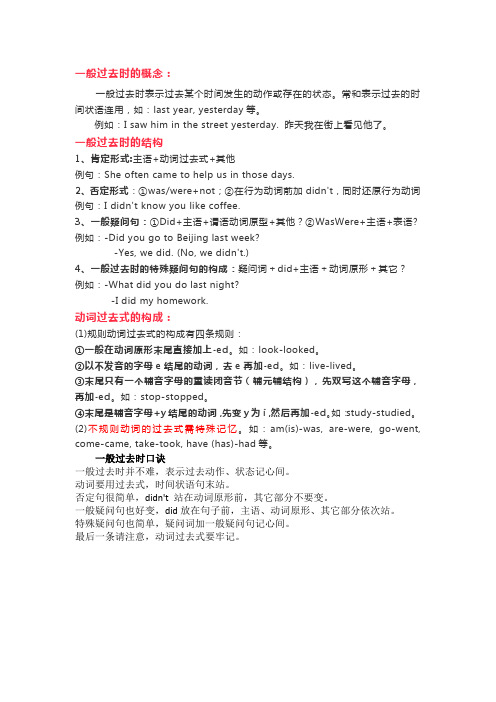
一般过去时的概念:一般过去时表示过去某个时间发生的动作或存在的状态。
常和表示过去的时间状语连用,如:last year, yesterday等。
例如:I saw him in the street yesterday. 昨天我在街上看见他了。
一般过去时的结构1、肯定形式:主语+动词过去式+其他例句:She often came to help us in those days.2、否定形式:①was/were+not;②在行为动词前加didn't,同时还原行为动词例句:I didn't know you like coffee.3、一般疑问句:①Did+主语+谓语动词原型+其他?②WasWere+主语+表语?例如:-Did you go to Beijing last week?-Yes, we did. (No, we didn't.)4、一般过去时的特殊疑问句的构成:疑问词+did+主语+动词原形+其它?例如:-What did you do last night?-I did my homework.动词过去式的构成:(1)规则动词过去式的构成有四条规则:①一般在动词原形末尾直接加上-ed。
如:look-looked。
②以不发音的字母e结尾的动词,去e再加-ed。
如:live-lived。
③末尾只有一个辅音字母的重读闭音节(辅元辅结构),先双写这个辅音字母,再加-ed。
如:stop-stopped。
④末尾是辅音字母+y结尾的动词,先变y为i,然后再加-ed。
如:study-studied。
(2)不规则动词的过去式需特殊记忆。
如:am(is)-was, are-were, go-went, come-came, take-took, have (has)-had等。
一般过去时口诀一般过去时并不难,表示过去动作、状态记心间。
动词要用过去式,时间状语句末站。
否定句很简单,didn't 站在动词原形前,其它部分不要变。
人教PEP六年级下册英语一般过去式讲解与综合练习

一般过去时(一)基础夯实:一般过去时1.一般过去时表示过去某个时间发生的动作或存在的状态,常和表示过去的时间状语连用。
一般过去时也表示过去经常或反复发生的动作感谢。
2.Be动词在一般过去时中的变化:⑴am 和is在一般过去时中变为was。
(was not=wasn’t)⑵are在一般过去时中变为were。
(were not=weren’t)⑶带有was或were的句子,其否定、疑问的变化和is, am, are一样,即否定句在was或were后加not,一般疑问句把was或were调到句首。
3.句中没有be动词的一般过去时的句子否定句:didn’t +动词原形,如:Jim didn’t go home yesterday.一般疑问句:在句首加did,句子中的动词过去式变回原形。
如:Did Jim go home yesterday?特殊疑问句:⑴疑问词+did+主语+动词原形?如: What did Jim do yesterday?⑵疑问词当主语时:疑问词+动词过去式?如:Who went to home yesterday?基础夯实:动词的过去式请熟记以下不规则动词的过去式:am/is—was are—were do—did go—wentcome—came swim—swam run—ran sing—sangdrink—drank give—gave begin—began win—wonhave—had get—got eat—ate sit--satfeel—felt sleep—slept sweep—swept leave—leftsee—saw draw—drew fly—flew blow—blewknow—knew throw—threw tell—told take—tookmake—made say—said ride—rode write—wroteput— put set—set hurt—hurt read—readbuy—bought teach—taught think—thought catch—caughtfight—fought bring—brought一般过去时的肯定陈述句一般过去时表示过去某个时间发生的动作或存在的状态,常用的时间状语有:yesterday , just now , last +时间, … ago , in 1980等。
一般过去时讲解及答案

一般过去时讲解及答案一、巧记一般过去时:动词一般过去时,表示过去发生的事;be用was或用were, have,has变had;谓语动词过去式,过去时间作标志;一般动词加-ed,若是特殊得硬记。
否定句很简单,主语之后didn’t添;疑问句也不难,did放在主语前;不含be动词时如果谓语之前有did,谓语动词需还原;动词若是was,were,否定就把not添。
含be动词时疑问句也不难,要把was,were放在主语前。
二、be的一般过去时:学习动词be的一般过去时,下面有一口诀,它可以帮你们更好地掌握动词be的一般过去时。
be的过去时有四巧:一是时间状语巧,表示过去的短语要记牢;二是形式巧,单数was,复数were;三巧是否定句结构,not紧跟was/were;四是疑问句式巧,was/were向前跑(提前)。
【一巧】时间状语(即标志词)巧。
一般过去时表示过去发生的动作或存在的状态,恰巧与表示过去的一些时间状语连用。
【二巧】形式巧。
它与一般现在时一样,形式多样:当主语是第一人称单数或第三人称单数时,谓语动词用was;主语是第二人称或其他人称复数时,谓语动词用were。
例如: I was in the classroom yesterday morning.昨天早上我在教室里。
He was at school last Tuesday.上周二他在学校。
They were over there a moment ago.刚才他们在那边。
【三巧】否定句结构巧。
与动词be的一般现在时一样,它在动词后面加not即可变成否定句,并且was, were与not可以缩写成wasn't, weren't。
即:主语+ wasn't/ weren't +表语+其他。
例如:I was not (=wasn't) here yesterday.昨天我不在这儿。
My parents were not (=weren't) at home last Sunday.上周日我父母不在家。
小学英语一般过去时专项讲解、练习和参考答案
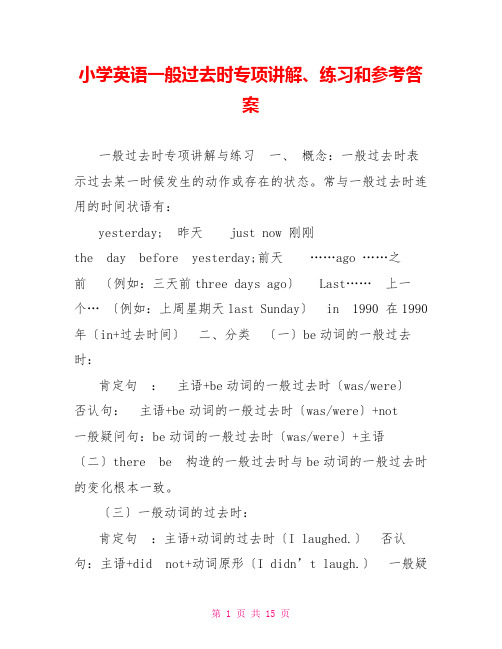
小学英语一般过去时专项讲解、练习和参考答案一般过去时专项讲解与练习一、概念:一般过去时表示过去某一时候发生的动作或存在的状态。
常与一般过去时连用的时间状语有:yesterday; 昨天 just now 刚刚the day before yesterday;前天……ago ……之前〔例如:三天前three days ago〕Last……上一个… 〔例如:上周星期天last Sunday〕 in 1990 在1990年〔in+过去时间〕二、分类〔一〕be动词的一般过去时:肯定句:主语+be动词的一般过去时〔was/were〕否认句:主语+be动词的一般过去时〔was/were〕+not 一般疑问句:be动词的一般过去时〔was/were〕+主语〔二〕there be 构造的一般过去时与be动词的一般过去时的变化根本一致。
〔三〕一般动词的过去时:肯定句:主语+动词的过去时〔I laughed.〕否认句:主语+did not+动词原形〔I didn’t laugh.〕一般疑问句:Did+主语+动词原形〔Did you laugh?〕三.巧记chant 动词一般过去时,表示过去发惹事;be用was或用were, have,has变had;谓语动词过去式,过去时间坐标志;一般动词加-ed,假设是特殊得硬记。
否认句很简单,主语之后didn’t添;疑问句也不难,did放在主语前;假如谓语之前有did,谓语动词需复原;动词假设是was,were,否认就把not添。
四、习题练习〔一〕用动词的适当形式填空:1. He ______(work) in that bank four years ago. 2.She ______ (live) in the US last Monday. 3.I ______ (see) him yesterday.4.He _______(e) to school at 6 o’clock this m orning.5. The boy _______(have) a bad cold yesterday. 6.When _______ you _______ (buy) that house? 7. He _______(tell) a story to his daughter yester day. 8. _____ you ____(try) to call me last night? 9.What _______you _______ (buy) in the shop? I ______ (buy) a coat just now. 10.The doctor ______ (get) up late this morning. 11. She ________ (paint) the wall last month. 12. My mother _______ (be) a worker 20 years ago.13. ________(be) you here just now? No, I ________(be not) here. 14.Why _______ your brother _______(cry) last night? 15. It______(be) my mother’s birthday yesterday. 〔二〕翻译以下句子:1.我上周去看爷爷和奶奶了。
一般过去时详细讲解与练习题

一般过去时详细讲解与练习题一般过去时详细讲解与练习题一、巧记一般过去时:表示过去发生的动作或存在的状态。
谓语动词过去式,过去时间作标志;否定句很简单,主语之后didn’t添;疑问句也不难,did放在主语前;不含be动词时如果谓语之前有did,谓语动词需还原;动词若是was, were,否定就把not添。
含be动词时疑问句也不难,要把was,were放在主语前。
一般过去时:学习一般过去时,有四巧:【一巧】时间状语(即标志词)巧。
一般过去时表示过去发生的动作或存在的状态,恰巧与表示过去的一些时间状语连用。
1. yesterday或以其构成的短语:yesterday morning(afternoon, evening)等;2. 由“last+一时间名词”构成的短语:last night, last year (winter, month, week)等;3. 由“时间段+ago”构成的短语:a moment ago, a short time ago, an hour ago等;4. 其它:just now等5. 由某些表示过去时态的从句等。
【二巧】形式巧。
它与一般现在时一样,形式多样:表示状态时,当主语是第一人称单数或第三人称单数时,谓语动词用was;主语是第二人称或其他人称复数时,谓语动词用were;表示动作时,使用动词的过去式,looked ,went ,等等。
例如:i was in the classroom yesterday morning.昨天早上我在教室里。
he went to school last Monday. 上周一他去了学校。
【三巧】否定句结构巧。
1.含be动词时:与动词be的一般现在时一样,它在动词后面加not即可变成否定句,并且was, were与not可以缩写成wasn't, weren't。
即:主语+wasn't/weren't +表语+其他。
一般过去时态讲解与练习

一般过去时态讲解与练习一般过去时主要表示过去某时发生的动作或情况;结构是“主语+动词的过去式”可以从以下几个方面来理解:1、过去某个时间所发生的动作或存在的状态,句中有明确的表示过去的时间状语如:yesterday 昨天, last night昨晚, last week上个星期, four days ago四天前, in 2002在2002年, just now刚才, the day before yesterday前天等;表示在过去某个时间发生的动作或情况;e.g. I bought a new shirt yesterday. He wasa worker two years ago.2、过去一段时间内,经常性或习惯性的动作;e.g. When I was a child,I often played with fire. Li Lei always walked to school last term.3、谈到已故人的情况时多用过去时;e.g. Lu Xun was a great writer.4有些发生时间不是很清楚的情况,实际是过去发生的,也应用过去时态;e.g. What did you say动词过去式的构成:be动词的过去式为was, were;行为动词的过去式有规则变化和不规则变化两种,规则变化有以下几种情况:1直接在动词原形末尾加-ed. e.g. work-----worked; ask------asked;2以e结尾的动词只加-d. e.g. arrive-----arrived; like-----liked.3末尾只有一个辅音字母的重读闭音节,应先双写这个辅音字母,再加-ed. e.g. shop-----shopped;4以"辅音字母+y"结尾的动词,先把y变成i,再加-ed. e.g. carry----carried; study------studied.不规则动词变过去式见同学们课本的最后一页,e.g. fly------flew; break-----broke; teach-----taught. 这些需要象生单词一样记住.其句式变化分为两种情况:1含有be动词的依然在be上做文章. e.g. I was born in 1980. I was not born in 1980. Were you born in 19802含有行为动词的变否定句要在行为动词前加助动词didn't.,同时把动词变成原形; 变一般疑问句,在句首加助动词did,同时把动词变成原形. e.g. I bought a gift for my mum yesterday. I didn't buy a gift for my mum yesterday. Did you buy a gift for your mum yesterday课后练习一、请写出下列动词的过去式;want arrive enjoy shop is see are eat二、指出下列句中的一处错误,并改正;1. We go to school early yesterday. __________2. She buys a dress last week. ___________3. Did you liked playing football _______4.--- Did you have a good trip --- No, I did. _______5. I enjoied Chinese very much. _______三、翻译下列句子,每空一词;1. 你昨晚去哪了Where ______ you _______ last night2. 我们昨天没有在学校; We __________ at school yesterday.3. 我两小时前在家里; I was at home ______ _______ _______.4. 你上周六去了动物园吗_______ you ________ to the zoo last Saturday5. 我去年不喜欢学数学; I _________ like learning math last year.6. 你昨天在哪儿呢Where ________ you yesterday7. 詹妮喜欢看书;昨晚她看了一本英语书;Jenny likes reading books. She _________ an English book last night.8. 上周六他做什么了他和妈妈去购物了;--- What ________ he _________ last Saturday--- He _________ shopping with his mother.9. 雷锋经常帮助其他人; Lei Feng often ________ other people.10. 我上周没有给你写信; I ________ ________ to you last week. Ⅲ按照括号中的要求改写句子;1. Lucy did her homework at home.改否定句Lucy ___________ ___________ her homework at home.2. She found some meat in the fridge.变一般疑问句___________ she __________ ___________ meat in the fridge3. She stayed there for a week.对划线部分提问__________ ___________ __________ she __________ there4. There was some orange in the cup.变一般疑问句_________ there ___________ orange in the cup5. Li Ming is at school now. 用yesterday 改写句子Li Ming _______ at school yesterday.四、请用正确动词形式填空;1. I _________ an exciting party last weekend. have2. She _______ at home yesterday morning. is3. Tommy __________ TV at his uncle’s last night.watch4. They all _________ to the mountains yesterday morning. go5. My friend, Carol, ________for the math test yesterday evening. study6 They____be on the farm a moment ago.7There____bea shop not long ago.8 Jenny____not goto bed until 11:00 o'clock last night.9 Danny _____read English five minutes ago.10 I _____seeLi Lei ____go out just now.11 He ____dohis homework every day. But he __not doit yesterday.12When I was young, I _____playgames with my friends.13When ____you_____writethis book I _____it last year.14 Did he____have lunch at home五、按照括号中的要求改写句子;11. Lucy did her homework at home.改否定句Lucy ___________ ___________ her homework at home.12. She found some meat in the fridge.变一般疑问句___________ she __________ ___________ meat in the fridge13. She stayed there for a week.对划线部分提问__________ ___________ __________ she __________ there14. There was some orange in the cup.变一般疑问句_________ there ___________ orange in the cup15. Li Ming is at school now. 用yesterday 改写句子Li Ming _______ at school yesterday.要点攻略牢记四个四,学好过去时在这一单元学习中,我们将要学习一种新的时态,那就是一般过去时;那么该如何正确运用这种时态呢没关系,请记好我帮你总结的四个四,相信你能够了解并能熟练地运用了;四种用法①表示在过去某个时间发生的动作或情况;例如:I went to school at 7:00 yesterday morning.我昨天早晨七点去上学;②表示在过去某个时间存在的状态;例如:She was not at home last night.她昨晚八点没在家;③表示在过去经常或反复发生的动作,常和often经常、always总是、sometimes有时等表示频率的时间状语连用;例如:He often had lunch at school last month.他上个月经常在学校吃午饭;④表示已故的人所做的事情或情况;例如:Ba Jin wrote a lot of novels for us.巴金写了很多部小说;四种时间状语①yesterday及相关短语;例如:yesterday morning/afternoon/evening 昨天上午/下午/晚上;②“last+ 时间状语”构成的短语;例如:last night/month/spring/year 昨晚/上个月/去年春天/去年;③“一段时间+ago”组成的短语;例如:three days ago 三天以前 four years ago四年以前;④“介词+ 时间名词”组成的短语;例如:in 1999 在1999年;on the morning of December 25th 在12月25号早上;四种谓语动词的表现形式①be动词的过去式was、were.例如:She was a teacher five years ago. 她五年前是一名教师;②行为动词的过去式,分为规则动词和不规则动词两种;规则动词的过去式的构成遵循以下四个规则:1直接在动词后加ed,例如:help-helped; want-wanted等;2以不发音的字母e结尾时,去掉e加ed 即直接加d , 例如:like-liked; use-used等;3以辅音字母y结尾时,把y变成i再加ed, 例如:carry-carried; study-studied等;4以重读闭音节结尾,双写最后一个辅音字母再加ed, 例如:stop-stopped; shop-shopped等;而不规则动词的过去式则需要我们认真下工夫去记了,例如:go-went; come-came; buy-bought等;③连系动词的过去式;例如:become-became She became angry. 她生气了;④情态动词的过去式+动词原形;例如:I could swim at the age of five. 我五岁时就会游泳了;四种句式的构成①一般过去时态的肯定句式“主语+动词过去式+其它”例如:Jenny bought a skirt yesterday. 詹妮昨天买了一件短裙;②一般过去时态的否定句式“主语+didn’t+动词原形+其它”例如:Jenny didn’t buy a skirt yesterday.詹妮昨天没有买短裙;③一般过去时态的一般疑问句式“Did+主语+动词原形+其它”例如:Did Jenny buy a skirt yesterday詹妮昨天买短裙了吗④一般过去时态的特殊疑问句式“疑问词+did +主语+动词原形+其它”例如:What did Jenny buy yesterday 詹妮昨天买了什么怎么样通过以上的讲解,你对一般过去时态有所了解并能够熟练地运用了吗希望你越学越进2. She was buy a dress last week. ___________________________________________3. Did you liked playing football ___________________________________________4.-Did you have a good trip -No, I didn’t.___________________________________________5. We didn’t flew kites last month. ___________________________________________三训练第三关:翻译句子我最棒;请将下列的汉语句子翻译成正确的英语;1 你昨晚去哪了_______________________________________我去了王府井的一家商店;_____________________________2 李明前天想给妈妈买件大衣,但他没有太多的钱;3 我们去年在南京玩得不快乐;___________________________________________参考答案一般过去时态集中训练营一训练第一关:小小单词难不到我;1. wanted2. arrived3. enjoyed4. shopped5. bought6. saw7. broke8. fell二训练第二关:生病的句子能奈我何1. We went to school early yesterday.2. She bought a dress last week.3. Did you like playing football4. -Did you have a good trip -Yes, I did / No, I didn’t.5. We didn’t fly kites last month.三训练第三关:翻译句子我最棒;1. Where did you go yesterday I went to a shop in Wangfujing Street.2. Li Ming wanted to buy a coat for his mother, but he didn’t have much money the day beforeyesterday.3. We didn’t have fun in Nanjing last year.点击语法——一般过去时补遗在上一期报纸中,我们了解了一般过去时态的基本用法和其他的基本常识;这一次呢,我们来聊聊有关一般过去时态的其他事项;1到底何时才用一般过去时态①句中有明确的表示过去的时间状语,表示在过去某个时间发生的动作或情况;如:I went to school at 7:00 yesterday morning. 我昨天早晨七点去上学;②句中有明确的表示过去的时间状语,表示在过去某个时间存在的状态;如:She was not at home last night. 她昨晚八点没在家;③表示在过去经常或反复发生的动作,常和often经常、always总是、sometimes有时等表示频率的时间状语连用;如:He often had lunch at school last month. 他上个月经常在学校吃午饭;④表示已故的人所做的事情或情况;如:Ba Jin wrote a lot of novels for us.巴金写了很多部小说;2动词过去式后的ed到底发什么音规则动词过去式后的“ed”读音时不一样的;那么,有什么不一样呢有这么几句口诀:“清读清,浊读浊,元音结尾还读浊,/t/、/d/之后读/id/;”怎么样,理解吗听我娓娓道来:“清读清”,是指动词以清辅音结尾,那么加的“ed”读作清辅音/t/,如asked /a:skt/,missed /mist/ 等;动词以浊辅音或元音结尾,那么加的“ed”读作浊辅音/d/,如cleaned /kli;nd/,lived /livd/,played /pleid/ 等;动词以/t/或/d /结尾,那么加的“ed”读作浊辅音/id/,如started /sta:tid/,studied /sta:did/ 等;趁热打铁一般过去时态小练习Ⅰ请用正确动词形式填空;1. I _________ an exciting party last weekend. have2. She _______ at home yesterday morning. is3. Tommy __________ TV at his uncle’s last night.watch4. They all _________ to the mountains yesterday morning. go5. My friend, Carol, ________for the math test yesterday evening. studyⅡ翻译下列句子;6. 你昨天在哪儿呢Where ________ you yesterday7. 詹妮喜欢看书;昨晚她看了一本英语书;Jenny likes reading books. She _________ an English book last night.8. 上周六他做什么了他和妈妈去购物了;--- What ________ he _________ last Saturday--- He _________ shopping with his mother.9. 雷锋经常帮助其他人;Lei Feng often ________ other people.10. 我上周没有给你写信;I ________ ________ to you last week.Ⅲ按照括号中的要求改写句子;11. Lucy did her homework at home.改否定句Lucy ___________ ___________ her homework at home.12. She found some meat in the fridge.变一般疑问句___________ she __________ ___________ meat in the fridge13. She stayed there for a week.对划线部分提问__________ ___________ __________ she __________ there14. There was some orange in the cup.变一般疑问句_________ there ___________ orange in the cup15. Li Ming is at school now. 用yesterday 改写句子Li Ming _______ at school yesterday.参考答案一般过去时小练习Ⅰ1. had 2. was 3. watched 4. went 5. studiedⅡ 6. were 7. read 8. did, do, went 9. helped 10. didn’t writeⅢ11. didn’t do 12. Did, find any 13. How long did, stay 14. Was any15. was。
(知识点)理解一般过去时的肯定否定和疑问句

(知识点)理解一般过去时的肯定否定和疑问句理解一般过去时的肯定、否定和疑问句一、肯定句一般过去时表示过去发生的动作或状态,肯定句的结构为:“主语 + 动词过去式 + 其他”。
例如:- She studied English last night.- We went camping last summer.二、否定句在一般过去时的否定句中,使用助动词"did not"或其缩写形式"didn't"来构成。
句子结构为:“主语 + did not + 动词原形 + 其他”。
例如:- He did not watch TV yesterday.- They didn't play football last weekend.三、疑问句1. 一般疑问句构成一般过去时的疑问句需要将助动词"did"提到句子的主语之前,句子结构为:“Did + 主语 + 动词原形 + 其他?”例如:- Did she go to the party?- Did they eat dinner at home?2. 特殊疑问句特殊疑问句是以疑问词引导的疑问句,疑问词可以是who, what, where, when, why, how等。
在一般过去时的特殊疑问句中,同样需要将助动词"did"放在疑问词之前,句子结构为:“疑问词 + did + 主语 + 动词原形 + 其他?”例如:- What did you do yesterday?- Where did they go for vacation?说明:- 一般过去时的肯定句中,动词需要变为过去式,例如:study变为studied, go变为went。
- 否定句和疑问句中都使用助动词"did",而动词恢复为原形。
注意助动词"did"本身表示过去时,所以后面的动词是原形。
四种过去时态讲解及习题总结

四种过去时态的讲解及习题(一)一般过去时一、一般过去时1.一般过去时表示过去某个时间发生的动作或存在的状态,常和表示过去的时间状语连用。
一般过去时也表示过去经常或反复发生的动作。
2.Be动词在一般过去时中的变化:⑴am 和is在一般过去时中变为was。
(was not=wasn't)⑵are在一般过去时中变为were。
(were not=weren't)⑶带有was或were的句子,其否定、疑问的变化和is, am, are一样,即否定句在was或were后加not,一般疑问句把was或were调到句首。
3.句中没有be动词的一般过去时的句子否定句:didn't +动词原形,如:Jim went home yesterday.Jim didn't go home yesterday.一般疑问句:在句首加did,句子中的动词过去式变回原形。
如:Jim went home yesterday.Did Jim go home yesterday?特殊疑问句:⑴疑问词+一般疑问句?如:Jim went home yesterday.Did Jim go home yesterday?What did Jim do yesterday?动词过去式变化规则:1.一般在动词末尾加-ed,如:pull-pulled, cook-cooked2.结尾是e加d,如:taste-tasted3.末尾是辅音字母加一个元音字母和一个辅音字母的重读闭音节,应双写末尾的辅音字母,再加-ed,如:stop-stopped4.以“辅音字母+y”结尾的,变y为i,再加-ed,如:study-studied5.不规则动词过去式:一般过去时练习Be动词的过去时练习(1)一、用be动词的适当形式填空1.I _______ at school just now.2.He ________ at the camp last week.3.We ________ students two years ago.4.They ________ on the farm a moment ago.5.Yang Ling ________ eleven years old last year.6.There ________ an apple on the plate yesterday.7.There ________ some milk in the fridge on Sunday.8.The mobile phone _______ on the sofa yesterday evening.二、句型转换1. It was exciting.否定句:________________________________________________ 一般疑问句:____________________________________________ 肯、否定回答:__________________________________________ 2. All the students were very excited.否定句:________________________________________________ 一般疑问句:____________________________________________ 肯、否定回答:__________________________________________ 3. They were in his pocket.否定句:________________________________________________ 一般疑问句:____________________________________________ 肯、否定回答:__________________________________________ Be动词的过去时练习(2)一、用be动词的适当形式填空1.I ______ an English teacher now.2.She _______ happy yesterday.3.They _______ glad to see each other last month.4.Helen and Nancy ________ good friends.5.The little dog _______ two years old this year.6.Look, there ________ lots of grapes here.7.There ________ a sign on the chair on Monday..8.Today _______ the second of June. Yesterday ______ the first of June. It _____ Children's Day. All the students ______ very excited.二、句型转换1. There was a car in front of the house just now.否定句:________________________________________________一般疑问句:____________________________________________肯、否定回答:__________________________________________肯、否定回答:__________________________________________三、中译英1. 我的故事书刚才还在手表旁边。
一般过去时知识点及练习
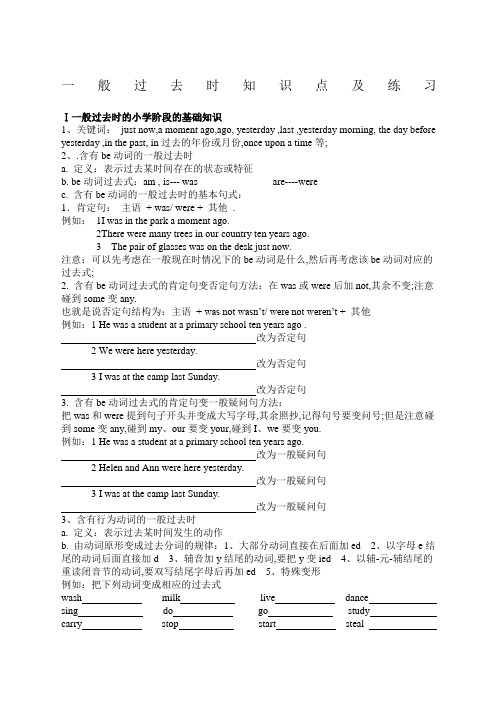
一般过去时知识点及练习Ⅰ一般过去时的小学阶段的基础知识1、关键词:just now,a moment ago,ago, yesterday ,last ,yesterday morning, the day before yesterday ,in the past, in过去的年份或月份,once upon a time等;2、.含有be动词的一般过去时a. 定义:表示过去某时间存在的状态或特征b. be动词过去式:am , is--- was are----werec. 含有be动词的一般过去时的基本句式:1.肯定句:主语+ was/ were + 其他.例如:1I was in the park a moment ago.2There were many trees in our country ten years ago.3 The pair of glasses was on the desk just now.注意:可以先考虑在一般现在时情况下的be动词是什么,然后再考虑该be动词对应的过去式;2. 含有be动词过去式的肯定句变否定句方法:在was或were后加not,其余不变;注意碰到some变any.也就是说否定句结构为:主语+ was not wasn’t/ were not weren’t + 其他例如:1 He was a student at a primary school ten years ago .改为否定句2 We were here yesterday.改为否定句3 I was at the camp last Sunday.改为否定句3. 含有be动词过去式的肯定句变一般疑问句方法:把was和were提到句子开头并变成大写字母,其余照抄,记得句号要变问号;但是注意碰到some变any,碰到my、our要变your,碰到I、we要变you.例如:1 He was a student at a primary school ten years ago.改为一般疑问句2 Helen and Ann were here yesterday.改为一般疑问句3 I was at the camp last Sunday.改为一般疑问句3、含有行为动词的一般过去时a. 定义:表示过去某时间发生的动作b. 由动词原形变成过去分词的规律:1、大部分动词直接在后面加ed 2、以字母e结尾的动词后面直接加d 3、辅音加y结尾的动词,要把y变ied 4、以辅-元-辅结尾的重读闭音节的动词,要双写结尾字母后再加ed 5、特殊变形例如:把下列动词变成相应的过去式wash milk live dancesing do go studycarry stop start stealc.含有行为动词过去式的肯定句变否定句方法:用didn’t来帮忙,后面跟动词原形;所以否定句的结构为:主语+didn’tdid not+动词原形+其他;注意碰到some变any.提示:在否定句中,不管是don’t, doesn’t或didn’t后面统统跟动词原形;例如:I did my homework yesterday evening.改为否定句My sister ate some pies just now.改为否定句We lived in Nanjing last year.改为否定句d. 含有行为动词过去式的肯定句变一般疑问句方法:用did来帮忙并放在句子开头且大写,但是过去式要恢复成动词原形,最后句号变问号;所以一般疑问句的结构为:Did+主语+动词原形+其他注意碰到some变any,碰到my、our要变your,碰到I、we要变you. 例如:I did my homework yesterday evening.改为一般疑问句My sister ate some pies just now.改为一般疑问句We lived in Nanjing last year.改为一般疑问句Ⅱ一般过去时的拓展知识初中1、特殊变形的过去式begin—began blow---blew buy---bought catch---caughtcome---came do/does---did draw---drew drink---drankdrive---drove drink---drank drive—drove eat---atefeel---felt find---found fly---flew forget---forgotget---got give---gave go—went grow---grewhave---had hear---heard hurt---hurt keep---keptknow---knew learn---learnt/learned let---let lie----laymake---made mean---meant meet---met put---putread---read ride---rode ring---rang run---ransay---said see---saw show---showed/shown sing---sangsit---sat sleep---slept speak---spoke spend---spentstand---stood steal---stole swim---swam take---tookteach---taught tell---told think---thought throw---threwunderstand---understood wear---wore win---won write---wrote2、表示过去的习惯或经常发生的动作,过去常常做某事:used to do sth例如:I used to swim in the river when I was young.课堂练习基础篇一、用所给词的适当形式填空1. Last week, my father be ill at home.2. Jim jog now. He jog every day last week.3. My mother usually do housework every day.But she do housework today.4. Last Friday, I take part in a sports meeting .5.--- he eatany ice creams last Sunday---No, he二、按要求改写句型1、Betty saw Daming in the library yesterday afternoon.改为否定句改为一般疑问句作肯定和否定回答2、I was in the library a moment ago.改为否定句改为一般疑问句作肯定和否定回答提高篇1.—Where were you last Saturday —I ____ in the Capital Museum.A. amB. will beC. wasD. have been2. Lucy ______ a student last year, but now she ______ a teacher.A. is; isB. was;isC. was;will beD. is;was3. He ______ go out with his parents, but now he ______ staying at home alone.A. used to;is used tB. is used to;used toC. use to;is used to4.—I’v just got a new MP4.—Where _____ you ____it—In a shopping mall near here.A. have; boughtB. did; buyC. are; boughtD. were; getting5. There ______ some flowers on the teacher’s des k just now, but now there______nothing on it.A. have; hasB.were; wasC. were; isD.has; has课后练习一、写出下列动词的过去式is\am_________ fly_______ plant________ are ________ drink_________play_______ go________ make ________ does_________ dance________ worry________ ask _____ taste_________ eat__________ draw________二、用所给词的适当形式填空1. They _______ glad to see each other last month.2. Today _____ the second of June. Yesterday ______ the first of June. It _____ Children's Day. All the students ______ very excited.3. I ______ watch a cartoon on Saturday.4. Her father _______ read a newspaper now. He always read one in the evening.5. We _________ to zoo yesterday, we _____ to the park. go三、句型变换1. There was a car in front of the house just now.否定句:__________________________________________________________一般疑问句:__________________________________________________________肯定回答和否定回答:___________________________________________2. They played football in the playground.否定句:__________________________________________________________一般疑问句:__________________________________________________________肯定回答和否定回答:________________________________挑战自我完成短文I _______get up at 2 a.m. and ________hear someone shouting. I _______ jump out of bed and _____ run to the kitchen. I ______ see nothing there: it was dark and quiet. I _________ run to the living room. The television ______ be still on. I ______forget to turn it off before I ________ go to bed last night.。
- 1、下载文档前请自行甄别文档内容的完整性,平台不提供额外的编辑、内容补充、找答案等附加服务。
- 2、"仅部分预览"的文档,不可在线预览部分如存在完整性等问题,可反馈申请退款(可完整预览的文档不适用该条件!)。
- 3、如文档侵犯您的权益,请联系客服反馈,我们会尽快为您处理(人工客服工作时间:9:00-18:30)。
课后练习
般过去式的否定句
1•动词是Be 动词时,一般过去时的否定式是在 be 动词后加not 。
句型:主语 +wasn' t/weren ' t …
I was in Beiji ng yesterday. We were in Beiji ng yesterday.
否定句:I wasn ' t in Beijing yesterday. We weren' t in Beijing yesterday.
Exercises 练习):
( ) 1. It ___________ (not be) Ben's birthday last Friday.
A. wasn 't
B. weren 't
C. isn 't
D. aren 't (
) 2. These me n _________________ ( n ot be) firemen a week ago. A. wasn 't B. weren 't C. not be D. aren 't (
) 3. They ____________ (not be) in Beijing three days ago. A. wasn 't B. weren 't C. not is D. aren 't
( ) 4. It ___________ (not be) the 2nd of November yesterday. A. wasn 't B. weren 't C. not are D. aren 2. 动词是行为动词时,一般过去时的否定式是在动词原形前加助动词 句
型:主语+didn ' t 动词原形
I told them the news yesterday. 否定句: I didn 't tell them the news
yesterday.
Exercises 练习):
1. Miss Guo ________________ (not get) up late the day before yesterday.
2. We all _______________ (not have) a good time three days ago.
3. She _______________ ( not find) a beautiful butterfly just now.
4. I _____________ (not watch) a cartoon yesterday evening.
5. Her father ___________ (not read) a newspaper last night.
行为动词一般过去时的疑问式 一、一般过去式的一般疑问
句:
1.有be 动词时,把be 动词提前
句型: Was+主语+…/ Were+主语+…
There were three cups of tea on the table just now. 一般疑问句 :Were
there three cups of tea on the table just now Yes, there was. No, there wasn 't.
1. There were some oranges in the cup. (变一般疑问句 )
__________ there __________ orange in the cup
2. It was Monday yesterday. (变一般疑问句 ) it Monday yesterday
3. Mary and Mike were in Shanghai last month. (变一般疑问句 ) Mary and Mike in Shanghai last month.
2. 动词是行为动词时,在句首加助动词 did
Did+主语+动词原形+其他
They finished their work at four.
一般疑问句 :Did they finish their work at four Yes, they did. No, they didn 't. Exercises 练习):
t
did not (didn 't).
he _______ (go) to that morning Yes, he ___________ .
brother ___________ (find) some meat i n the fridge (冰箱).No, he _____________ .
Mary ________ (read) an in teresti ng book about history Yes, she ___________ .
No, the stude nts of Class Six _______ (have) an En glish lesi on the day before yesterday
they didn ' t.
二、一般过去时的特殊疑问式
1.动词是行为动词时:疑问词+did+主语+动词原形……
They fini shed their work at four.
A B
对划线部分提问:A: What did they do at four
B: When did they finish their work
Exercises练习):
1.They went to park by car yesterday.
____________________ they ____________ to park yesterday
2.They did their homework yesterday evening.
_________ did they __________yesterday eve ning
3.Her sisters flew kites in the park last Friday.
_________ did her sisters _________ kites last Friday
4.I liked the red shirt in the past.
_________ shirt did you ________ in the past.
2.有be动词时:疑问词+ was/were+主语+其他
Jack was in the classroom just now
A B
对划线部分提问:A: Who was in the classroom just now
B: Where was Jack just now
1.Mary and Peter were in Beijing five days ago.
__________________ Mary and Peter five days ago
2.There were four teachers in the office.
__________________ teacher ________ there in the office
3.He was a policema n last year.
__________________ he in the past
4.Mike was a teacher in the past.
____________________ a teacher in the past。
